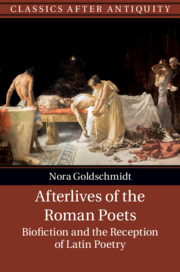Book contents
- Afterlives of the Roman Poets
- Classics after Antiquity
- Afterlives of the Roman Poets
- Copyright page
- Dedication
- Contents
- Figures
- Series Editors’ Foreword
- Acknowledgements
- Abbreviations and Note on the Text
- Introduction
- Chapter 1 Medieval Ovids
- Chapter 2 Staging the Poets: Ben Jonson’s Poetaster
- Chapter 3 Lucan and Revolution
- Chapter 4 Lucretius and Modern Subjectivity
- Chapter 5 The Death of the Author: Hermann Broch’s Der Tod des Vergil
- Post-Mortem
- Bibliography
- Index Locorum
- General Index
Introduction
Published online by Cambridge University Press: 11 November 2019
- Afterlives of the Roman Poets
- Classics after Antiquity
- Afterlives of the Roman Poets
- Copyright page
- Dedication
- Contents
- Figures
- Series Editors’ Foreword
- Acknowledgements
- Abbreviations and Note on the Text
- Introduction
- Chapter 1 Medieval Ovids
- Chapter 2 Staging the Poets: Ben Jonson’s Poetaster
- Chapter 3 Lucan and Revolution
- Chapter 4 Lucretius and Modern Subjectivity
- Chapter 5 The Death of the Author: Hermann Broch’s Der Tod des Vergil
- Post-Mortem
- Bibliography
- Index Locorum
- General Index
Summary
The introduction makes the case for fictional biography (or ‘biofiction’) as fundamental to understanding the reception of Roman poetry. Bringing together developments in life-writing studies and recent work on ancient biography and poets’ Lives, it develops a concept of biofictional reading as a key mode of the reception of Latin poetry. Aware of ancient habits of reading poetry ‘for the life’, Roman poets wrote autofictional versions of their Lives for later readers to pick up, creating a body of literature that demands to be read in terms of Lives in reception.
Keywords
- Type
- Chapter
- Information
- Afterlives of the Roman PoetsBiofiction and the Reception of Latin Poetry, pp. 1 - 27Publisher: Cambridge University PressPrint publication year: 2019

